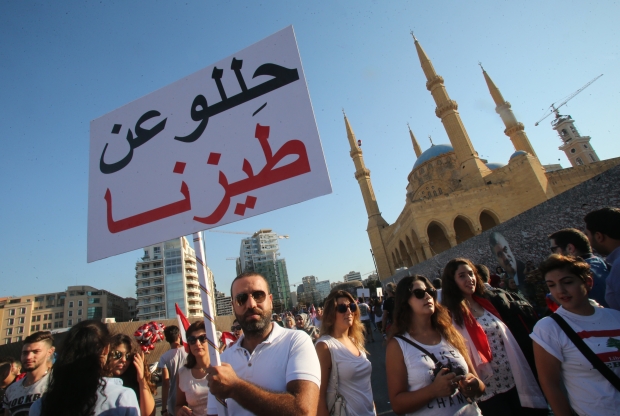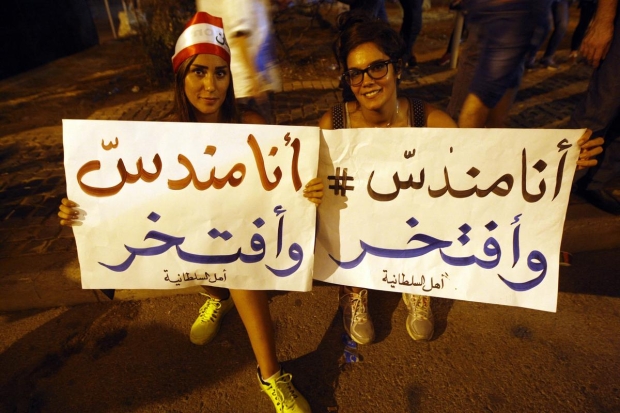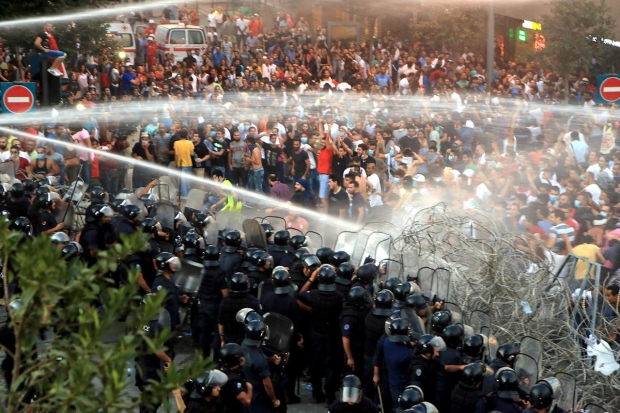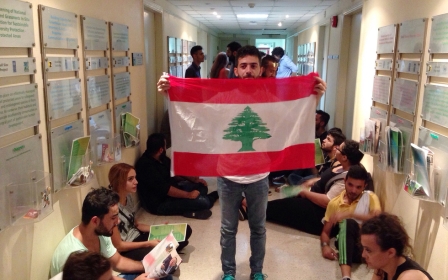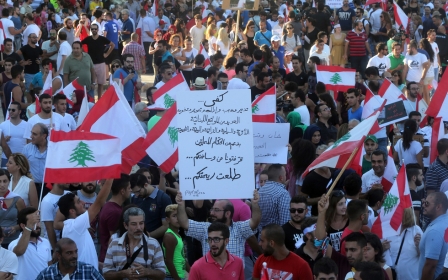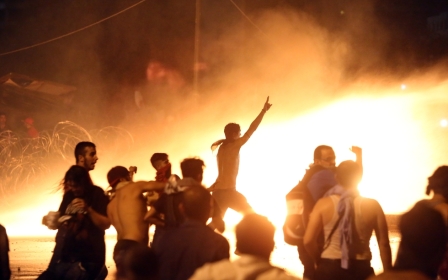ANALYSIS: Flame of revolution sparks in Lebanon's burgeoning protest movement
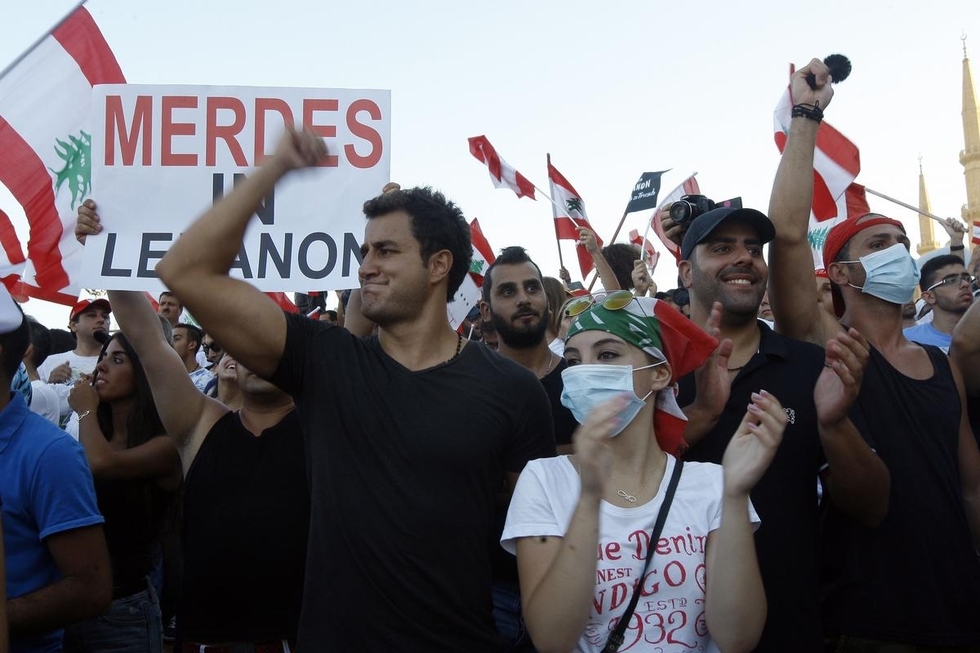
Protests in Lebanon that were initially launched as a demonstration against the country’s rubbish crisis have captured attention for another reason: in a rare show, protesters out on the streets are chanting their demands outside of what many would argue to be the confines of social-sectarian groups and political parties.
On 17 July, the government’s contract with the cleaning company Sukleen expired, resulting in the suspension of rubbish collecting services. Rubbish piled up in the streets, with the hot summer sun contributing to a nauseating smell and repellent heaps obstructing the roads and intersections.
While this crisis represents one of the most prominent manifestations of the collapse of state services, the protests, due to diverse participation, have widened the scope of the demands to address perceived wider political corruption, the inequalities faced by a mass refugee population, and socioeconomic circumstances that have overwhelmed this small country.
Escalation of protests
The protest movement is only a few weeks old, and the formation of different groups has sustained the momentum, rather than derailing it.
The most well-known of these groups, the "You Stink" movement, was formed by civil society activists as a response to the waste crisis in early August. While its members have more clout on social media as opposed to on the streets, they were still the first group to successfully organise a large number of people to protest.
Their initial demand was the resignation of the Minister of Environment Mohammed Mashnouq, and to treat the waste crisis as an environmental issue separate from other political matters. The movement insists on non-violent direct action and its non-involvement in political action, for fear of co-option from other political parties.
Yet the trajectory of protests changed on the weekend of 22 and 23 August, when thousands more protesters descended on Beirut’s main squares. The stimulus was attributed to the behaviour of the Lebanese security forces, who had responded with force to a protest held a few days earlier. Videos of police brutality went viral.
According to Moe Ali Nayel, a journalist based in Beirut, new sets of protesters were mobilised who raised the level of demands to include political issues, such as the “resignation of specific ministers, the entire cabinet, and even the toppling of the entire political class”.
“The You Stink framework was superseded by people calling for the removal of the government,” Nayel said, “but by default this campaign remained the public mainstream representation of the protests.”
Infiltrators or angry working class?
Tension between the You Stink organisers and other groups began on 23 August. The day before, thousands of protesters had been met with police violence. Even the media was not exempt. According to Joey Ayyoub, one of the You Stink organisers, footage of the violence was caught on live streams and videos, and presented a clear image that the violence was almost completely one-sided - that is, coming from the police.
“It started with beatings and that was followed soon after by water cannons and tear gas,” Ayyoub told Middle East Eye. “You can clearly hear us yelling ‘silmiya, silmiya’ [peaceful, peaceful]. It lasted for several hours before the government ordered the security forces to stop firing.”
The protest the next day in Riad al Solh Square took a sour turn, as fierce clashes - including live bullets fired in the air and Molotov cocktails - took place between police and protesters. The You Stink movement was quick to label the protesters who had engaged in such clashes as “infiltrators” and “rioters,” and sought to distance themselves.
Elia el Khazen, a member of the Socialist Forum, which is part of the Al Chaab Youreed coalition - the primary objectors to separating the waste crisis from the rest of the political demands - referred to the harm that the You Stink organisers contributed to by using the term “infiltrators”.
“The media jumped on board and helped create this dichotomy between peaceful demonstrators and rioters/infiltrators,” Khazen said, pointing out that this was the same tactic the Syrian government used towards anti-government protesters at the start of the demonstrations in March 2011.
“The ‘infiltrators’ are basically working-class teenagers, born in the early 2000s,” Khazen continued, who is documenting the violations against those arrested.
Many accused the You Stink organisers of abandoning the protest and going to the nearby Martyrs Square, leaving the other protesters battling the police on their own.
“Those who stayed in Riad al Solh were predominantly working class or lower middle class,” said Mahmoud Mroueh, one of the protesters. The You Stink organisers, he added, deserved to be labelled as upper class and liberal, as they were “quick to call everyone who was loud and rowdy as an ‘infiltrator'.”
The anger of the protesters, Mroueh argued, alienates protesters from the upper class and is to be expected “because they are the ones who most suffer as a result of our government’s corruption and incompetence”.
“The clashes have revitalised the protests rather than subduing them,” Mroueh said, “because they are bringing more and more people of the working and lower middle classes to the protests, especially when their brothers, cousins, sons, etc are coming home injured or not coming home at all.”
Ayyoub maintains that chaos and confusion surrounded events on that day, in addition to severe lack of communication.
“I personally don’t even know who started the violence,” he said.
Depoliticisation, sectarianism and respectability
But Khazen said that the organisers’ confusion is precisely what led to the depoliticisation of the events at Riad al Solh.
“They set up huge sound systems [blasting] songs in Martyrs Square, disabling political discourse and chants,” he said. “[This] let the alternative dominant discourse of the ‘military junta’ and nationalism take over the square, and the absence of socioeconomic demands and discourse on inequalities.”
The Al Chaab Youreed coalition remained in Riad al Solh Square, away from the sound systems in order to continue their political chanting and to radicalise the people around them.
Sectarianism, which has plagued Lebanon for decades, was another accusation used by some organisers to blame for the unrest. Images of young men with Shia or Hezbollah tattoos were circulated on social media as evidence of further infiltration.
Mroueh dismissed these allegations, explaining that while some young men did indeed engage in sectarian chants at the beginning, they stopped when confronted by other protesters.
“They started chanting against sectarianism, and even went as far as to curse Nabih Berri (the Shia parliamentary speaker) loudly and openly, when people were accusing them of working for him or being sent by him,” Mroueh said. “These young men have never in their lives been to a protest where chanting these things wasn't what everyone was doing, it's all they know.”
Mroueh said that it was more about the “bourgeois standards of respectability” rather than accusations of sectarianism.
“If Sunni or Christian or Druze working class people had been present at the protest, the same would have been said about them as was said about the Shia, as well as about Syrian and Palestinian refugees who were present,” he stated.
Unified demands
The dynamics of the young protest movement are unlikely to remain stagnant in the face of constant change and developments. Many of the groups have formed coalitions and updated their list of demands.
The main ones agreed upon by all groups include holding parliamentary elections outside the arena of sectarian limitation; the immediate and unconditional release of all detainees; holding accountable those responsible for the alleged theft of municipal and public funds; transferring the power of the Council for Development and Reconstruction to municipalities; and holding police to account for their perceived brutality against protesters.
“The trash crisis was the catalyst,” Ayyoub said. “The You Stink movement is not the only voice, and we have no right to be. In the end we want a democracy, and what we’re asking for is the basic rule of law to be reapplied.”
The government has crossed a line, and people have reached the point where they are unable to look back, Ayyoub asserted.
“People’s living conditions are so bad,” Ayyoub said. “They don’t have anything to lose at this point. Either the government finds a way to calm things down by resigning and calling for parliamentary elections, or I simply cannot tell you what’s going to happen.”
Uncertain future
The uncertainty of the future is a testament to the arduous and long-term goals of setting Lebanon back on its feet, which involves domestic issues, many of which are influenced by regional turbulences. Almost half of Lebanon’s population are Palestinian and Syrian refugees who suffer from discriminatory laws in education, housing and job opportunities, and the country’s two main political blocs- March 8 and March 14 - are aligned and opposed to the neighbouring Syrian government respectively, each backed opposingly by Iran and Saudi Arabia.
“We have a long way ahead of us,” Mroueh said, underlining that the decades-old militias run by sectarian warlords need to be disposed for the movement to be a success. “Our short term goals are the resignation of this government and immediate parliamentary elections. From there, we'll see where to go and what to do.”
“The fact that so many people are renouncing their political and sectarian affiliations is a positive thing to look forward to,” Elia al Khazen reflected, “but it feels like the organisers are lowering their political demands in order to achieve small practical gains which the regime will use to co-opt and destroy the momentum of the movement. I hope I am wrong.”
Middle East Eye propose une couverture et une analyse indépendantes et incomparables du Moyen-Orient, de l’Afrique du Nord et d’autres régions du monde. Pour en savoir plus sur la reprise de ce contenu et les frais qui s’appliquent, veuillez remplir ce formulaire [en anglais]. Pour en savoir plus sur MEE, cliquez ici [en anglais].


